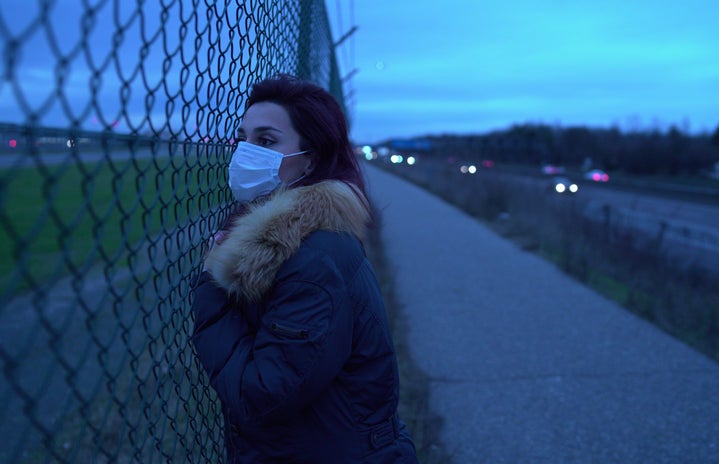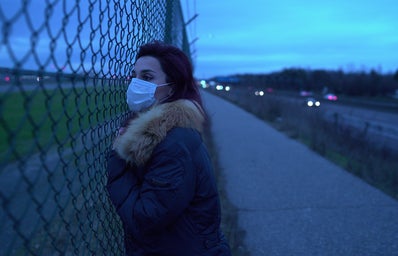I’ve been spending a lot of time in my room and on my own ever since returning to campus. My typical day looks like this: wake up, do some yoga, grab breakfast, get some work done in the workspace I’ve created in my room, get on TikTok, eat a snack, Zoom lecture, dinner, Netflix and sleep. Then I wake up and start it all over again. Even hanging out with friends during a pandemic looks completely different — we’ve all had to get creative — and see each other a lot less. Most days I, along with a lot of college students, am alone. In times like these that can be a double edged sword.
During the mass quarantine from mid-March to early August, I saw my mental health take a positive turn. Being on my own or with family and having endless days with nothing on the calendar, since my summer internship and plans were cancelled, I became more connected with myself. With time to put my wants and needs first, to challenge my thought patterns and the space to heal, I saw a positive shift in my mental and emotional well-being. I even quit therapy, after being in it for 8 months, because I was finally in a space where I could manage any stressors in my life, even living through a pandemic I had learned how to cope with. Then I found out that I had to return to campus for my final semester.
I came back to campus and suddenly I had online classes, responsibilities, and moments where I have to be in public and interact with others. It was a shock honestly, I went from being around the same 3 members of my family everyday to stepping into an altered reality. Walking through campus it’s like everyone’s here but we’re really not. Classes, dorms and dining halls are only a reminder of what we are all living through. Shielded with masks everywhere you go, case numbers increasing, limited study spots and standing 6-feet apart for food, your only constant is yourself. The stress of starting a new semester has been coupled with the stress of living through a pandemic.
Unfortunately, fear and stress are an expected effect of a pandemic. A Yale Medicine article shows the state of mental health in America during the pandemic, “mental health providers are concerned about everyone, including those who aren’t in high-risk situations like health care workers or patients who have survived a serious case of COVID-19. In May, the U.S. Census Bureau released data revealing that one-third of Americans reported showing signs of clinical anxiety or depression.” COVID-19 is taking a toll on everyone, whether you have the virus or not.
All this alone time while being back on-campus can leave me in my head a lot and give me an overdose of anxiety. The slightest hint of a sore throat or tired feeling and I am convinced I have coronavirus. I probably check my temperature once a day just for my own reassurance. This anxiety happens even though I haven’t been exposed, I don’t go to restaurants or bars and I follow all of the health and safety practices. My mind goes through all of the slightest chances that I could have been around someone who tested positive or absentmindedly touched my face or I check the cases in the area and become extremely overwhelmed and terrified at the rising numbers. Alongside this anxiety of contracting COVID-19 I also worry that I will easily slip back into a negative mental space while being back at college.
Over the summer the Center for Disease Control and Prevention conducted a survey on the mental health challenges that have arisen because of COVID-19. The survey found that young adults are one of the greatest groups affected, “The percentage of respondents who reported having seriously considered suicide in the 30 days before completing the survey (10.7%) was significantly higher among respondents aged 18–24 years (25.5%), minority racial/ethnic groups (Hispanic respondents [18.6%], non-Hispanic black [black] respondents [15.1%])…Mental health conditions are disproportionately affecting specific populations, especially young adults”. College students already face mental health issues and access, unfortunately the pandemic has only made matters worse.
As someone who has had struggles with mental health in the past, living through a pandemic hasn’t been easy. I try to surround myself with the facts, being aware of the symptoms and ways that one can contract the virus has given me a stronger feeling of control. Prioritizing my mental health and making time for me to take care of my body or get away from the news has also been helpful. The most important thing to remember is that you are not alone in this.
Resources:
Cook Counseling Center
2475 Oak Lane
Blacksburg, VA 24061
540-231-6557
RAFT Crisis Hotline
540-961-8400
NAMI HelpLine
1-800-950-NAMI (6264) or info@nami.org



